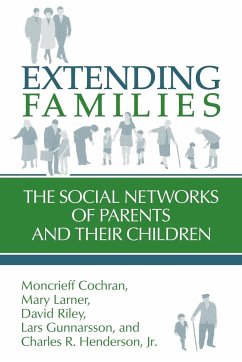How do personal networks evolve and what roles do they play for parents, and for the development of children? Can these ties with relatives, neighbours, and friends provide stability for family members during periods of disruption caused by divorce, unemployment, geographic dislocation or serious illness? How do networks change over time? To what extent are network members interchangeable; can unrelated friends take the place of close relatives? These are among the questions addressed in Extending Families, a ground-breaking study about how personal networks evolve, and what roles they play for parents and for the development of children. The volume is an outgrowth of a ten-year cooperative research effort carried out by the authors as part of the Comparative Ecology of Human Development Project at Cornell University. In this comprehensive and integrated volume, Moncrieff Cochran and his colleagues document and compare the roles network members play in the lives of African-American and Caucasian parents in the United States, and parents in Sweden, Wales and West Germany. They then go beyond those descriptive comparisons to consider, within a larger ecological framework, the ways that networks change over time, and the impact of different network resources on the perceptions and behaviour of developing individuals. The impacts on parents' networks of participation in a community-based family support programme are examined, and a more general discussion of how public policies might strengthen access to informal social supporters is also provided. Moncrieff Cochran draws on this unique body of research in the concluding chapters of the volume to offer a new, integrated conception of how personal networks develop, and how they affect and are affected by development. In his foreword to this book, Urie Bronfenbrenner remarks that this conception provides the framework for a new approach to the scientific study of social networks and their implications for policy and practice'. Extending Families will be of special interest to family and urban sociologists, developmental and community psychologists, and other working in the areas of family policy, family studies, and human development.
Table of contents:
Foreword U. Bronfenbrenner; Preface; Part I. Ideas and Themes: 1. Personal networks in the ecology of human development M. Cochran; Part II. Settings, Methods and Illustrations: 2. Settings and methods D. Riley et al; 3. The social networks interview L. Gunnarsson; 4. Descriptive illustrations M. Cochran and C. R. Henderson, Jr.; Part III. The Influences of Race, Class and Culture: 5. Social networks, race and ethnicity W. E. Cross, Jr; 6. The social networks of married mothers in four cultures M. Cochran et al; 7. The social support networks of single parents: Sweden and the United States M. Cochran and L. Gunnarsson; Part IV. Impacts on Perceptions and Performance: 8. Network influences upon perception of the child: solo parenting and social support M. Cochran and C. R. Henderson, Jr.; 9. Network influences on father involvement in childrearing D. Riley; 10. The social networks of six-year-olds: context, content and consequence M. Cochran and D. Riley; Part V. Changes in Networks Over Time: 11. Changes in network resources and relationships over time M. Larner; 12. Local residential mobility and its effects on social networks: a cross-cultural comparison M. Larner; 13. Formal supports and informal social ties: a case study M. Cochran and C. R. Henderson, Jr.; Part VI. Social Networks and Human Development: 14. The network as an environment for human development M. Cochran; 15. Environmental factors constraining network development M. Cochran; 16. Factors influencing personal social initiative M. Cochran; 17. Personal networks and public policy M. Cochran; Appendix 1. The social network interviews; Endnotes; References.
Table of contents:
Foreword U. Bronfenbrenner; Preface; Part I. Ideas and Themes: 1. Personal networks in the ecology of human development M. Cochran; Part II. Settings, Methods and Illustrations: 2. Settings and methods D. Riley et al; 3. The social networks interview L. Gunnarsson; 4. Descriptive illustrations M. Cochran and C. R. Henderson, Jr.; Part III. The Influences of Race, Class and Culture: 5. Social networks, race and ethnicity W. E. Cross, Jr; 6. The social networks of married mothers in four cultures M. Cochran et al; 7. The social support networks of single parents: Sweden and the United States M. Cochran and L. Gunnarsson; Part IV. Impacts on Perceptions and Performance: 8. Network influences upon perception of the child: solo parenting and social support M. Cochran and C. R. Henderson, Jr.; 9. Network influences on father involvement in childrearing D. Riley; 10. The social networks of six-year-olds: context, content and consequence M. Cochran and D. Riley; Part V. Changes in Networks Over Time: 11. Changes in network resources and relationships over time M. Larner; 12. Local residential mobility and its effects on social networks: a cross-cultural comparison M. Larner; 13. Formal supports and informal social ties: a case study M. Cochran and C. R. Henderson, Jr.; Part VI. Social Networks and Human Development: 14. The network as an environment for human development M. Cochran; 15. Environmental factors constraining network development M. Cochran; 16. Factors influencing personal social initiative M. Cochran; 17. Personal networks and public policy M. Cochran; Appendix 1. The social network interviews; Endnotes; References.









